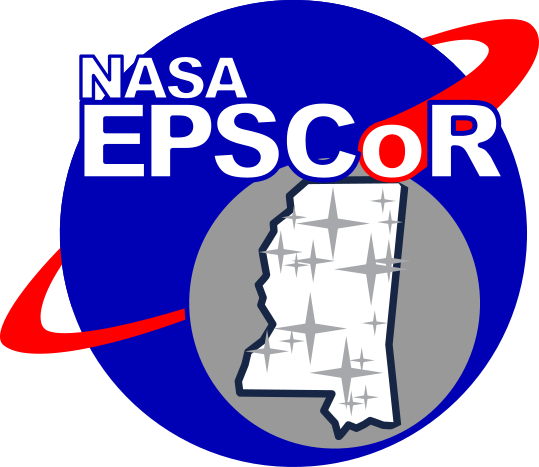
Mississippi NASA EPSCoR
Nathan Murray
nmurray@olemiss.edu
+1 (662) 915-3190
Earnest Stephens
estephen@olemiss.edu
+1 (662) 915-1187
Whitney Jackson
wjackson@olemiss.edu
Funding Opportunities
NASA EPSCoR Research Opportunity
The NASA Established Program to Stimulate Competitive Research (EPSCoR) solicits research proposals through a Notice of Funding Opportunity (NOFO) addressing high-priority NASA research and technology development needs. Awards are up to $750,000 for a three-year performance period. The Mississippi NASA EPSCoR Director, with oversight from the Mississippi Research Consortium (MRC), runs a statewide pre-proposal competition to identify the most relevant and competitive proposal for submission.
Research Infrastructure Development (RID) Grants
The Mississippi NASA EPSCoR Research Infrastructure Development (RID) Program provides research initiation seed grants aimed at strengthening Mississippi’s research competitiveness.
Proposals are being accepted through 7 June 2024. See details through the links below.
NASA EPSCoR Rapid Response Research (R3) Opportunity
The goals of R3 program are to provide a streamlined method to address research issues important to NASA, and to enable NASA EPSCoR researchers to work with NASA to solve research issues impacting the Agency’s programs/missions. The Rapid Response Research (R3) program is an attempt to implement research within NASA and commercial partners to address technical issues. This opportunity will allow EPSCoR researchers to work alongside NASA and commercial partners for up to one year and is intended to strengthen the bonds among EPSCoR jurisdictions, NASA, commercial partners, and other entities. Proposals must directly respond to a single Research Focus Area as defined in the solicitation. The recent list of Research Focus Areas is available in the full NASA solicitation here.
Interested researchers must submit a Notice of Intent (NOI) no later than 13 November 2023 using the link below. This NOI submission is a simple InfoReady form to notify the MS NASA EPSCoR Director, Nathan Murray, that a Science Investigator wants to propose. This will allow coordination of all interests. No budget information is required for the NOI.
Anticipate Notice of Intent (NOI) submission for FY25 will be in early October 2024.
NASA EPSCoR Internation Space Station (ISS) Flight Opportunity
The National Aeronautics and Space Administration (NASA) Office of Science, Technology, Engineering, and Mathematics (STEM) Engagement (OSTEM), in cooperation with the International Space Station (ISS) Research Office, Space Operations Mission Directorate (SOMD), Exploration Systems Development Mission Directorate (ESDMD), Science Mission Directorates (SMD), Space Technology Mission Directorate (STMD), and NASA’s nine Centers, plus NASA’s Jet Propulsion Laboratory (JPL), solicits proposals for the NASA Established Program to Stimulate Competitive Research (EPSCoR) International Space Station (ISS) Flight Opportunity. Each funded NASA EPSCoR proposal is expected to establish research activities that will make significant contributions to the strategic research and technology development priorities of one or more of NASA’s Mission Directorates, and contribute to the overall research infrastructure, science and technology capabilities, higher education, and economic development of the jurisdiction receiving funding.
Each selected NASA EPSCoR flight project shall perform scientific and/or technical research in areas that support NASA’s strategic research and technology development priorities. Proposals shall emphasize how a flight in microgravity will influence/improve the results/quality of any ground-based research.
NASA EPSCoR Sub-Orbital Flight Opportunity (SFO)
Travel/Interaction Grants
The Mississippi NASA EPSCoR Research Infrastructure Development (RID) Program provides travel/interaction grants to promote the development of research infrastructure and the development of partnerships between NASA research assets and those of the jurisdiction.
The solicitation is open, and proposals will be accepted at any time through 30 April 2022. Awards are up to $1,750 per request to support travel/interactions that seek to develop new relationships with NASA scientists and engineers at the Mission Directorates and/or Field Centers. The travel/activity must be completed no later than 5/31/2022. Due to COVID-19 travel restrictions, researchers may opt to propose virtual meetings, technical interchange sessions, mini-workshops, or other means of interaction in lieu of travel.
Active Research Programs
NASA EPSCoR Research Awards
Dr. Padmanava Dash
Mississippi State University
Dr. Shanti Bhushan
Mississippi State University
NASA EPSCoR ISS Awards
Dr. Ahmed Al-Ostaz
University of Mississippi
Dr. Patrick Curtis
University of Mississippi
Dr. Likun Zhang
University of Mississippi
Research Infrastructure Development Awards
University of Mississippi
Mississippi State University
Mississippi State University